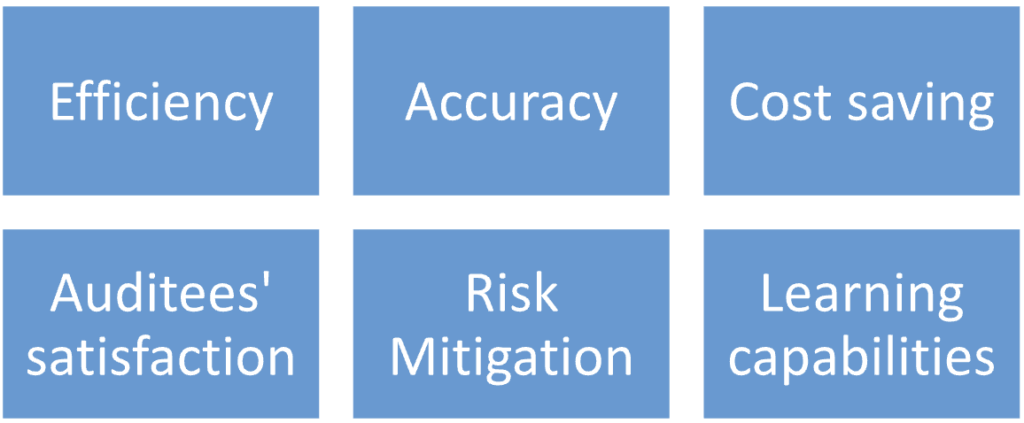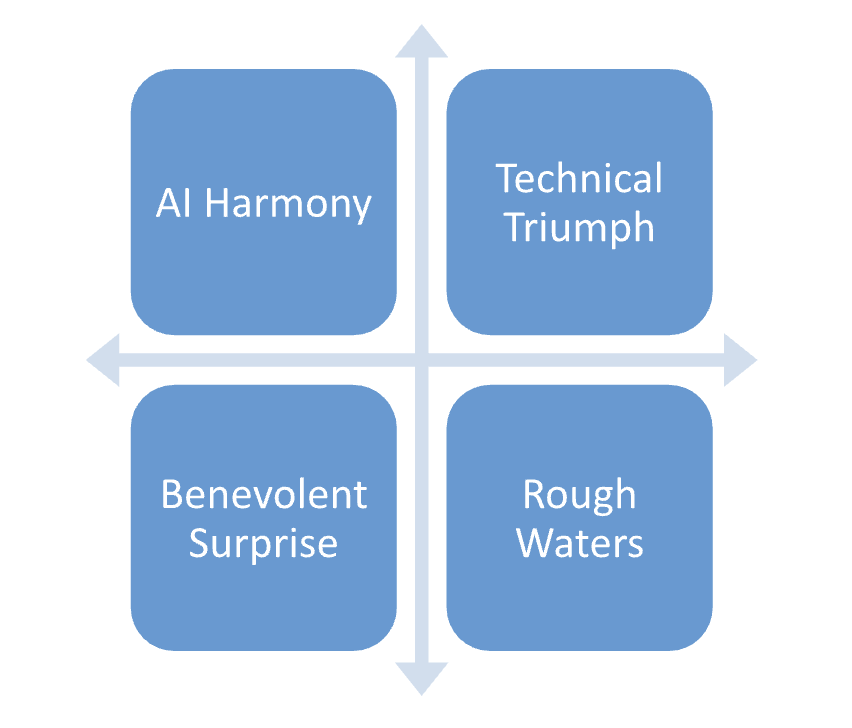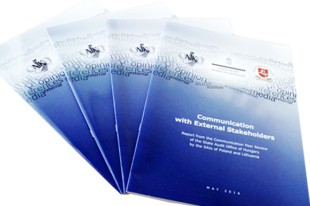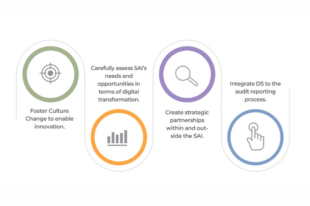Leveraging AI in Performance Auditing: A Feasibility Study for the State Audit Office of Thailand

Author: Dr. Sutthi Suntharanurak, Director of the International Affairs Office, State Audit Office of the Kingdom of Thailand
The State Audit Office (SAO) of Thailand has embarked on a journey of digital transformation. The objective is to leverage AI to enhance audit performance and foster a data-driven culture within the organization. This initiative is in line with their audit policy, which emphasizes the importance of using advanced technologies in audit processes. This article focuses on the feasibility of incorporating the advanced language model, as generative AI like ChatGPT, in SAO’s performance audit.
Challenges and Readiness:
Implementing a Generative AI system like ChatGPT or Google Bard in audit processes presents several challenges. Infrastructure must be established, financial investments made, data privacy ensured, and complex legal landscapes navigated. The auditors themselves face the need to acquire new skills, deal with changing roles, and overcome potential mistrust in AI technologies.
For a smooth transition, SAO needs to be AI-ready. This means creating robust technical infrastructure, implementing data governance, developing skills through training, and managing change effectively. A strategic alignment with the organization’s goals and compliance with legal and ethical considerations are vital.
Measuring Benefits:
The benefits of AI implementation can be quantified through various metrics. Efficiency, accuracy, cost savings, auditees’ satisfaction, risk mitigation, and learning capabilities are all parameters that can indicate successful implementation. Maintaining a balanced scorecard of these measures is important, as benefits often become more apparent over time and with continued use.

The State Audit Office (SAO) of the Kingdom of Thailand, has shown a pioneering stance towards incorporating artificial intelligence (AI) in its auditing operations since 2021. Particular emphasis has been placed on performance audits, with the aim of launching an AI-driven copilot project. This initiative aligns with the State Audit Policy of the State Audit Commissioner, which encourages digital transformation through a data-driven approach to audit, implementation of scientific and technological tools for audit, and fostering a data culture within the organization. The proposed study aims to explore the feasibility of utilizing Generative AI like ChatGPT, an advanced AI model, to further leverage the performance audit.
SAO Thailand conducted this foresight approach to explain the preferable future of AI implementation in performance audits. Four scenarios were developed based on the feasibility study of implementing ChatGPT in performance audit at the SAO Thailand. They reflected diverse possibilities ranging from highly favorable conditions with immense benefits to scenarios where numerous obstacles impede the successful implementation of ChatGPT.
The four scenarios were constructed based on varying levels of readiness and potential benefits that may be obtained from implementing ChatGPT in performance audit at the SAO Thailand.
Scenario 1 AI Harmony – High Readiness, High Benefit: In this ideal scenario, SAO Thailand is fully prepared for the integration of ChatGPT. Infrastructure, training, and organizational culture are at a point where they can readily incorporate AI. The performance audit significantly improves with the integration of ChatGPT, with a substantial increase in audit speed, accuracy, and comprehensiveness
Scenario 2 Technical Triumph – High Readiness, Low Benefit: SAO Thailand has high readiness, with a strong infrastructure and a supportive organizational culture. However, the integration of ChatGPT does not significantly improve the performance audit due to unforeseen limitations or obstacles in the AI’s application to specific auditing tasks.
Scenario 3 Benevolent Surprise – Low Readiness, High Benefit: Despite not being fully prepared for AI integration, the implementation of ChatGPT in the performance audit yields significant improvements. However, low readiness may result in initial difficulties, slower uptake of the AI, or inefficient use of the technology, limiting the potential benefits.
Scenario 4 Rough Waters – Low Readiness, Low Benefit: In this least ideal scenario, SAO Thailand is not well-prepared for the integration of AI in terms of infrastructure, training, or culture. Furthermore, the integration of ChatGPT does not substantially enhance the performance audit, either due to the nature of the tasks or inefficiencies in AI use.

These scenarios provide a comprehensive range of possibilities that could emerge from the integration of ChatGPT into SAO Thailand’s performance audit, and emphasize the need for preparedness and realistic expectations regarding the benefits of AI integration.
Constructive Recommendations
To be prepared for AI integration, SAO Thailand can consider the following recommendations:
- Technological Adaptation: It is recommended that SAO Thailand invest in technological infrastructure and training programs to facilitate the smooth integration and use of ChatGPT.
- Regulatory Adjustments: Legal and ethical guidelines need to be reviewed and updated to accommodate the use of AI in auditing processes.
- Data Culture Enhancement: A continued emphasis on fostering a data culture, where data is valued and effectively utilized, should be upheld.
- Regular Evaluation: Post-implementation, a regular assessment of the impact of ChatGPT on the performance audit should be carried out to ensure its effectiveness and address any issues promptly.
Strategy for the Implementation of Generative AI in SAIs
Generative AI, like ChatGPT or Google Bard, is a rapidly evolving field with the potential to revolutionize the audit process. By automating repetitive tasks, identifying patterns and anomalies, and generating insights, Generative AI can be a tool to help auditors to be more efficient, effective, and objective.
To ensure a successful implementation of Generative AI in SAIs, the following strategic approaches should be considered:
- Build awareness and literacy in Generative AI. SAIs should promote knowledge about and capacity around employing Generative AI among their stakeholders, including auditors, managers, and decision-makers. This can be done through workshops, webinars, and other educational initiatives.
- Clear goals for Generative AI. SAIs should define the specific outcomes they expect from integrating Generative AI into their processes. These goals could include increasing efficiency, improving accuracy, or reducing risk.
- Assess the feasibility of Generative AI. SAIs should evaluate their current audit procedures and infrastructure to determine whether Generative AI is a feasible solution. This includes assessing the availability of data, the technical expertise of staff, and the regulatory environment.
- Develop a Generative AI blueprint. SAIs should develop a roadmap that outlines the vision, objectives, and steps for integrating Generative AI into their operations. This blueprint should be flexible enough to adapt to changes in technology and the audit environment.
- Conduct pilot projects. Before deploying Generative AI on a large scale, SAIs should conduct pilot projects to test the technology and identify any potential challenges. This will help to ensure that the technology is fit for purpose and that the SAI is prepared to manage any risks.
- Implement Generative AI iteratively. SAIs should implement Generative AI in an iterative manner, starting with small-scale projects and gradually expanding its use over time. This will allow the SAI to learn from its experiences and make necessary adjustments as needed.
- Train auditors on Generative AI. SAIs should provide training to their auditors on how to use Generative AI effectively. This training should cover the basics of Generative AI, how to apply it to specific audit tasks, and to check for inaccuracies and biases.
- Adhere to ethical and compliance standards. SAIs should ensure that their use of Generative AI adheres to ethical and compliance standards. This includes ensuring that the technology is used in a fair and unbiased manner, and that it does not violate the privacy or confidentiality of individuals.
- Establish partnerships with Generative AI experts. SAIs should establish partnerships with Generative AI experts to stay up-to-date on the latest developments in the field and to obtain guidance on how to implement the technology effectively.
By considering these strategic approaches, SAIs can ensure a successful implementation of Generative AI and realize the full potential of this technology to improve the audit process.
For more information, please contact: sutthisun@gmail.com.





